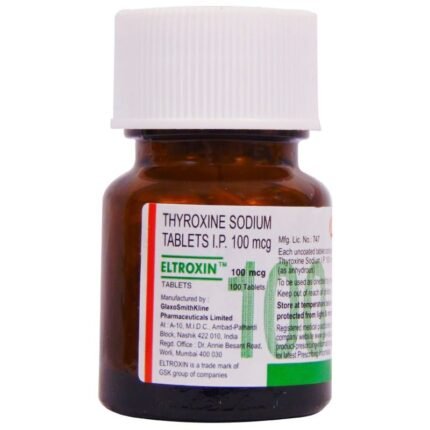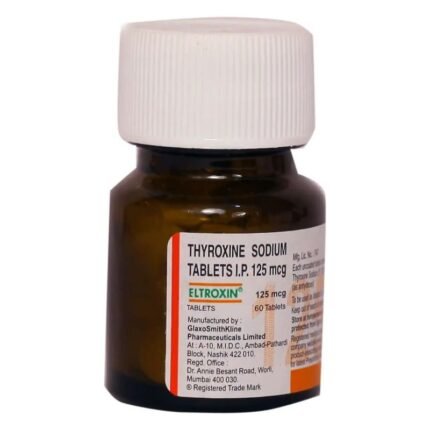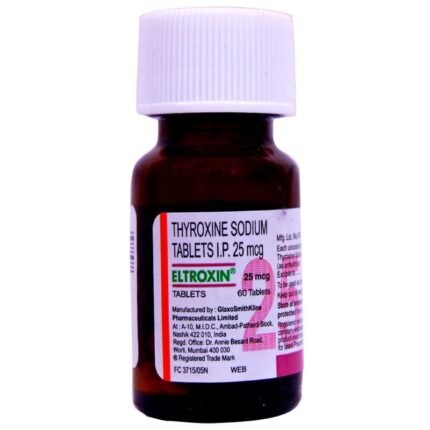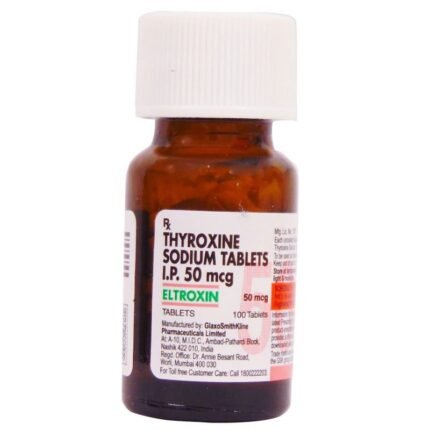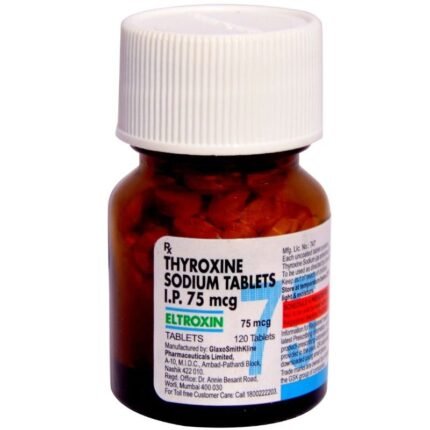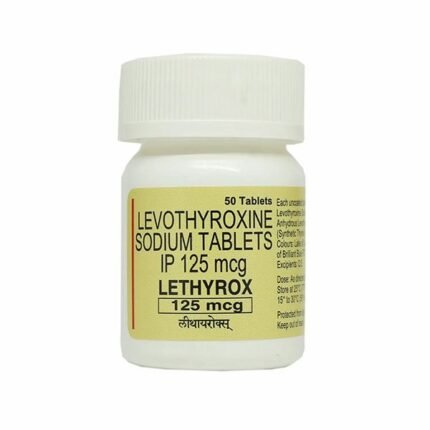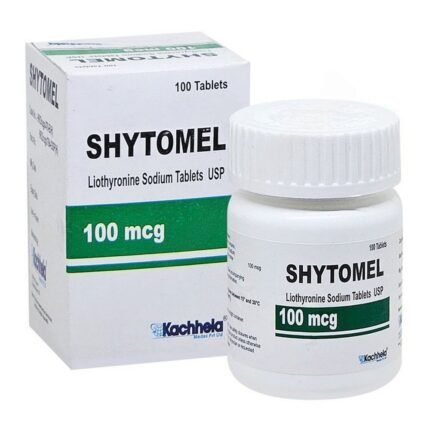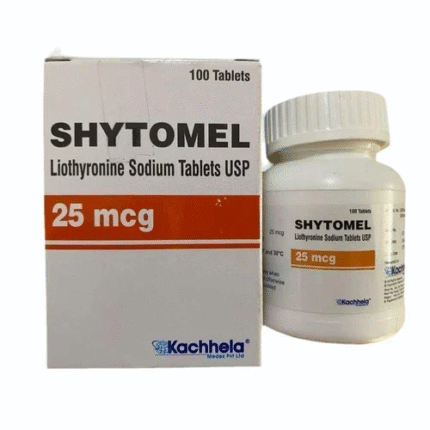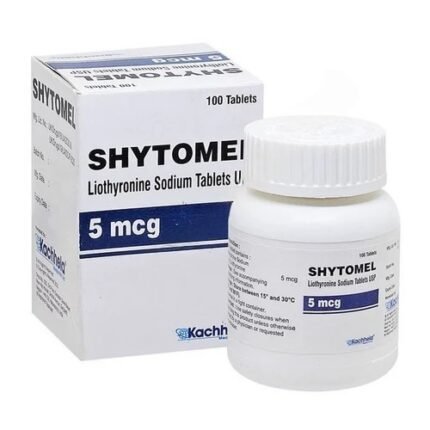Thyroid Care: Supporting a Healthy Metabolism and Hormonal Balance
The thyroid is a small, butterfly-shaped gland located in the neck, but its impact on your overall health is massive. It regulates metabolism, energy levels, heart rate, and hormonal balance. When the thyroid doesn’t function properly, it can lead to conditions like hypothyroidism, hyperthyroidism, and goiter, affecting everything from your weight to your mood.
In this guide, we’ll explore thyroid disorders, their symptoms, treatments, and how to manage them with the right medications and lifestyle strategies.
Eltroxin 100mcg (Thyroxine Sodium)
Price range: $10.00 through $49.00Eltroxin 125mcg (Thyroxine Sodium)
Price range: $11.00 through $62.00Eltroxin 25mcg Tablets (Thyroxine)
Price range: $6.00 through $35.00Eltroxin 50mcg (Thyroxine Sodium)
Price range: $7.00 through $40.00Eltroxin 75mcg (Thyroxine Sodium)
Price range: $8.00 through $42.00Lethyrox 125 mcg Tablets (L-thyroxine)
Price range: $12.00 through $84.00Shytomel 100 mcg
Price range: $180.00 through $430.00Shytomel 25 mcg Tablets (Liothyronine Sodium)
Price range: $100.00 through $270.00Shytomel 5 mcg Tablets (Liothyronine Sodium)
Price range: $80.00 through $210.00🧠 Why Thyroid Health Matters
Thyroid hormones (T3 and T4) are essential for:
-
Regulating metabolic rate
-
Supporting brain development
-
Maintaining body temperature
-
Balancing hormones
-
Controlling heart and digestive function
-
Influencing energy levels and mental clarity
🩺 Common Thyroid Disorders
1. Hypothyroidism (Underactive Thyroid)
Occurs when the thyroid gland does not produce enough hormones.
Symptoms: Fatigue, weight gain, depression, dry skin, cold sensitivity, constipation.
Treatment: Thyroid hormone replacement (Levothyroxine).
2. Hyperthyroidism (Overactive Thyroid)
The thyroid gland produces too much hormone.
Symptoms: Rapid heartbeat, weight loss, anxiety, heat intolerance, insomnia, diarrhea.
Treatment: Antithyroid medications (Methimazole, Propylthiouracil), beta-blockers, sometimes radioactive iodine.
3. Hashimoto’s Thyroiditis
An autoimmune form of hypothyroidism.
Treatment: Lifelong levothyroxine therapy.
4. Graves’ Disease
Autoimmune cause of hyperthyroidism.
Treatment: Antithyroid drugs, radioactive iodine, or surgery.
5. Goiter
Enlargement of the thyroid gland can occur in both hypo- and hyperthyroid conditions.
Treatment: Depends on cause—may involve iodine supplementation or surgery.
💊 Common Medications for Thyroid Management
-
Eltroxin / Synthroid (Levothyroxine): Replaces deficient thyroid hormone in hypothyroidism.
-
Thyronorm / Euthyrox: Alternative brands of levothyroxine.
-
Methimazole (Tapazole): Suppresses excess hormone production in hyperthyroidism.
-
Propylthiouracil (PTU): Used when Methimazole isn’t tolerated, especially in pregnancy.
-
Iodine supplements or Radioactive Iodine Therapy: For goiter or an overactive thyroid.
-
Beta-blockers (e.g., Propranolol): Help manage symptoms like tremors and rapid heartbeat in hyperthyroidism.
✅ Benefits of Proper Thyroid Care
-
Restores normal energy levels and metabolism
-
Prevents complications like heart problems, infertility, and goiter
-
Improves mental clarity and emotional stability
-
Supports weight management
-
Helps regulate menstrual cycles and fertility
💡 Tips for Managing Thyroid Health
-
Take thyroid medication consistently on an empty stomach
-
Avoid calcium, iron, and antacids within 4 hours of thyroid meds
-
Get regular TSH and thyroid hormone tests to monitor levels
-
Eat a balanced diet rich in selenium, zinc, and iodine
-
Avoid excessive soy and cruciferous vegetables in untreated hypothyroidism
-
Manage stress, as it can worsen thyroid symptoms
-
Stay physically active to support metabolism
⚠️ Side Effects & Precautions
-
Levothyroxine may cause palpitations, anxiety, or insomnia if overdosed
-
Antithyroid medications may cause rash, liver problems, or reduced white blood cells
-
Radioactive iodine is not suitable during pregnancy or breastfeeding
-
Always have thyroid levels monitored to adjust dosage as needed
Frequently Asked Questions (FAQs)
Can thyroid disorders be cured?
Not always. Most conditions like hypothyroidism and Hashimoto’s require lifelong management, but they can be effectively controlled with medication.
What happens if I skip my thyroid medicine?
Missing doses regularly can lead to hormone imbalance, symptoms returning, and long-term health issues.
Can I take thyroid medication with food?
It’s best to take it on an empty stomach, 30-60 minutes before eating, for maximum absorption.
How often should thyroid levels be tested?
Typically, every 6–12 months, or more frequently if adjusting the dosage.
📝 Conclusion
Thyroid care is essential for maintaining your energy, mood, metabolism, and overall well-being. Whether you’re managing hypothyroidism, hyperthyroidism, or autoimmune thyroid disease, the right treatment plan and medications can help you lead a healthy, balanced life.
Explore our trusted thyroid care solutions today and take the first step toward better hormonal health.


